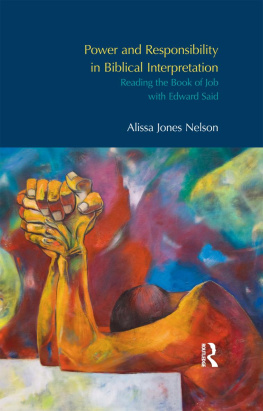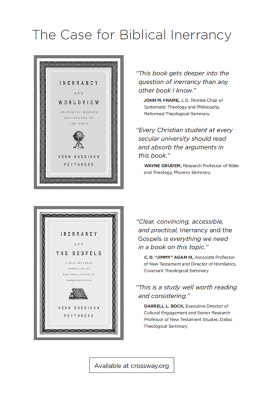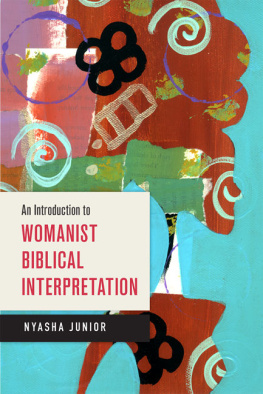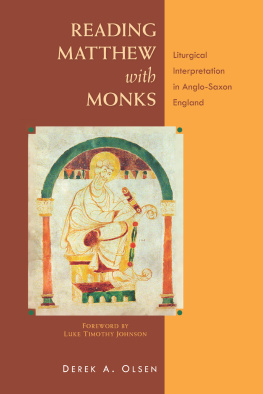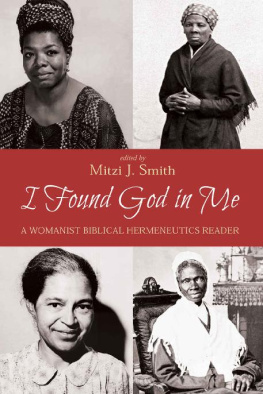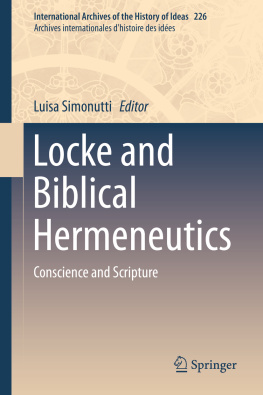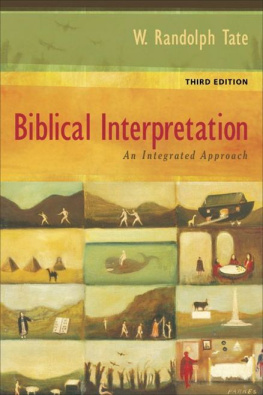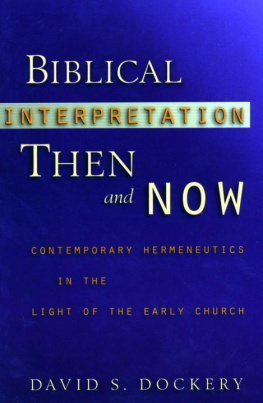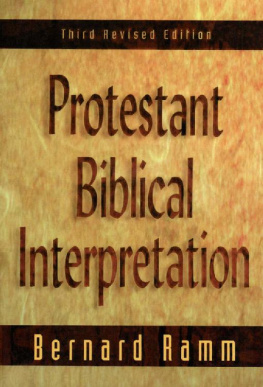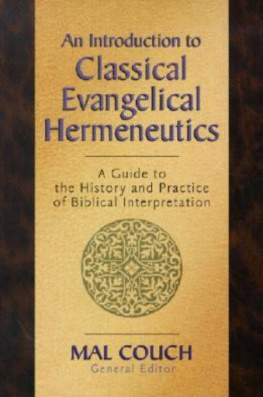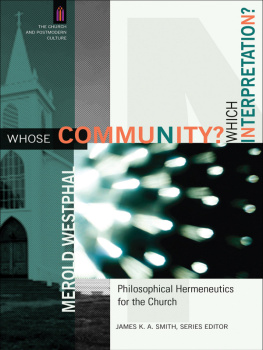Power and Responsibility in Biblical Interpretation
BibleWorld
Series Editor: Philip R. Davies, University of Sheffield
BibleWorld shares the fruits of modern (and postmodern) biblical scholarship not only among practitioners and students, but also with anyone interested in what academic study of the Bible means in the twenty-first century. It explores our ever-increasing knowledge and understanding of the social world that produced the biblical texts, but also analyses aspects of the Bibles role in the history of our civilization and the many perspectives not just religious and theological, but also cultural, political and aesthetic which drive modern biblical scholarship.
Power and Responsibility in Biblical Interpretation
Reading the Book of Job with
Edward Said
Alissa Jones Nelson
First published 2012 by Equinox, an imprint of Acumen
Published 2014 by Routledge
2 Park Square, Milton Park, Abingdon, Oxon OX14 4RN
711 Third Avenue, New York, NY 10017, USA
Routledge is an imprint of the Taylor & Francis Group, an informa business
Alissa Jones Nelson 2012
All rights reserved. No part of this book may be reprinted or reproduced or utilised in any form or by any electronic, mechanical, or other means, now known or hereafter invented, including photocopying and recording, or in any information storage or retrieval system, without permission in writing from the publishers.
Notices
Practitioners and researchers must always rely on their own experience and knowledge in evaluating and using any information, methods, compounds, or experiments described herein. In using such information or methods they should be mindful of their own safety and the safety of others, including parties for whom they have a professional responsibility.
To the fullest extent of the law, neither the Publisher nor the authors, contributors, or editors, assume any liability for any injury and/or damage to persons or property as a matter of products liability, negligence or otherwise, or from any use or operation of any methods, products, instructions, or ideas contained in the material herein.
British Library Cataloguing-in-Publication Data
A catalogue record for this book is available from the British Library.
Library of Congress Cataloging-in-Publication Data
Nelson, Alissa Jones.
Power and Responsibility in Biblical Interpretation : Reading the Book of Job with Edward Said / Alissa Jones Nelson.
p. cm. -- (BibleWorld)
Includes bibliographical references and index.
ISBN 978-1-84553-889-7 (hb) 1. Bible--Criticism, interpretation, etc. 2. Bible-- Hermeneutics. 3. Said, Edward W. 4. Bible. O.T. Job--Criticism, interpretation, etc. I. Title.
BS511.3.N44 2010
223.10601--dc22
2010009960
ISBN 978-1-84553-889-7 (hardback)
Typeset by ISB Typesetting Ltd
For Papa
CONTENTS
I wish to express my profound gratitude first to Prof. Mario I. Aguilar, who is not only a brilliant supervisor and a wise guide through the academic jungle but also a wonderful friend. Thanks also to Dr Nathan Mac-Donald, who provided support and encouragement, shared generously of his wisdom, and mediated at least one crisis of confidence. I am grateful to Dr Bill Yarchin, who first introduced me to biblical exegesis; to Dr John E. Hartley, who shared his love of the book of Job; to Dr Jim Hedges, who encouraged my early academic efforts; and to Dr Emily Griesinger, who was an excellent teacher and is also a beautiful friend.
I have also been fortunate to benefit from the wisdom and experience of two great lights in my field. Thanks are due to Prof. R. S. Sugirtharajah for his insightful comments, encouragement, and availability. Thanks also to Prof. Gerald O. West, who not only provided encouragement but who generously shared his unpublished work and gave of his time.
I wish to remember here the late Prof. Marcella Althaus-Reid, who modelled a warmth, passion, and compassion in her life and scholarship which I hope will someday characterize my own. A bright light has gone, and she will be missed.
I am grateful to Colin Bovaird, Lynda Kinloch, and Katrina Acland, without whose expertise and efforts on my behalf I may never have got my hands on half of the books necessary to this project.
I am also deeply grateful to numerous friends who have provided intellectual stimulation, emotional stability, comfort, encouragement, and pub companionship over the last three years. Special thanks to Kathleen Burt, Laura Delgado, Mariam Kamell, Michael Kenny, Jen Kilps, Annette McCabe, Yumi Murayama-Cain, Casey Nicholson, Meg Ramey and April Ruiz.
To the community of All Saints Scottish Episcopal Church I wish to express my love and appreciation, not only for the emotional support its members have provided over the years, but also for the constant and welcome reminder that there is more to life than academia. I especially wish to thank Chris and Jake, Amber and Paul, Andre, Andrew, Julie, Kate, Rob, Tim, Tina, Verena and Victor.
Thanks to Nina Osborne and Vicki Falls, who provided a flexible and supportive work environment and who made my time in St Andrews so enjoyable.
Thanks to the Jack Kent Cooke Foundation, without whose generous financial support this project would have been impossible.
Thanks also to Don Julio and Don Melchor, for reasons which will be apparent to those familiar with their work.
Thanks to my father, who took the time to read and re-read more drafts than he or I care to remember, and whose support has enabled me to live up to his faith in me. Thanks also to my mother, who taught me the importance of strength and vulnerability. Thanks to my brother, who influences me more than he realizes.
Thanks to Genki, who listened to numerous drafts, rants, and wails of despair with good humour and affection, and who took me on long walks when I needed it most.
Finally, there are no words to adequately express my gratitude to my husband, Matt, for the love he has unfailingly demonstrated throughout this process. Only he knows how much I owe him for his constant encouragement, understanding, patience, humour, and genuine interest. If there is anything good in this project, it is as much his as it is mine.
Gaps and Ghettos
Over the past 30 years, the rise of poststructuralism, postcolonialism and liberation theologies has presented a number of challenges to the field of biblical hermeneutics. Each of these approaches emphasizes the subjectivity of interpreters, texts, and interpretations, and each argues in various ways for the necessity of self-determination in interpretive communities. These are all positive challenges to which more traditional voices in the discipline have been required to respond, and many of these voices have responded positively and supportively. However, one may also observe that the positive developments associated with increasing emphases on subjectivity and self-determination have been accompanied by a retrogressive ghettoization of interpreters, interpretations and interpretive communities.
This negative development is a direct result of the positive developments previously mentioned. Subjectivity and self-determination by their very nature passively encourage the development of interpretive ghettos, which only active integrative effort on the part of interpreters can overcome. Each of these ghettos legitimizes itself with reference to its particular context as well as to the subjectivity of all other perspectives and the potential equality of all interpretations. Each is primarily concerned with its own context and with the interpretive interests delimited by various aspects of that context. This is not to suggest that boundary-crossing efforts have not been or are not being made. Nevertheless, the overall trend is towards segregation; divergent interpretive communities are increasingly viewed as separate but equal.

